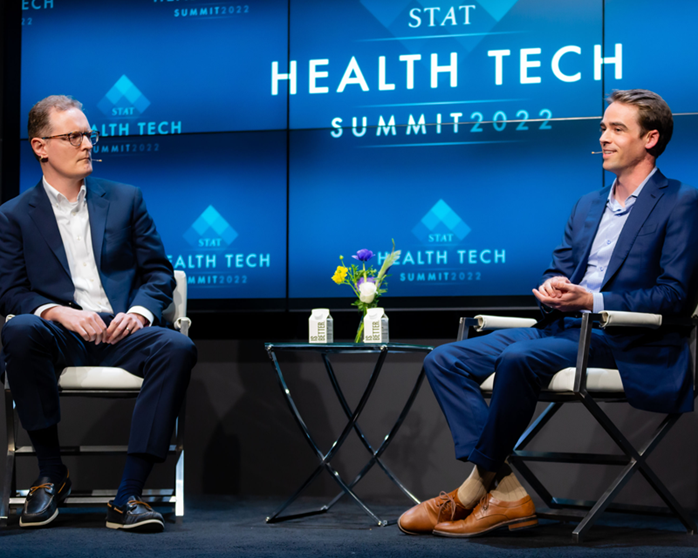Highlights from the discussion
How has the health tech and diagnostics landscape changed since Theranos and COVID-19?
As a biotech startup founder himself, Tyler Shultz shared candid perspective on the health venture capital landscape and the culture around pitching. He said it can be tempting to overemphasize how you communicate around revenue projections to attract investment. One of the legacies of the Theranos fallout is that founders now must do a better job of articulating their investment thesis to the public. Founder and CEO of COVID-19 diagnostics testing company Cue Health discussed how the Theranos backlash collapsed the credibility of startups in the diagnostics space, and how it took a cataclysmic event like the pandemic to shift momentum back in its favor. More broadly, STAT Senior Writer Matthew Herper asked Shultz about the biggest lessons from his experience. Nodding to his grandfather George Shultz’s involvement in the board of Theranos and his support of Elizabeth Holmes, Schultz said, “You can be right so many times throughout your career, but that doesn’t mean you can’t be wrong.”
How is big tech studying women’s health trends in underexplored areas?
Greg Corrado, who helps lead healthcare research at Google AI, noted that one of the areas he is most excited about is the role that AI and cell phones may be able to play in healthcare. He shared insight on the use of AI-powered tools on mobile devices with low-cost portable sensors to provide ultrasounds during pregnancy in low- and middle-income countries where less the half of mothers have access to an ultrasound. Cell phones could provide fetal and maternal health screenings, which could be transformative for remote populations. Dr. Lauren Cheung of Apple’s health division shared that Apple is currently leading a study tracking data from iPhones and Apple watches to better understand how demographics and lifestyle affect infertility and menopause. With 70,000 participants enrolled in the study at the second-year mark, Apple’s research demonstrates how companies can leverage a platform of scale to create a more equitable health system. This is particularly compelling given that the link between fertility and lifestyle is an underexplored area in health.
If you gave a health tech leader a magic wand, what ”big bet” would they tackle first to fix our healthcare system?
In one of the liveliest panels of the day, STAT convened four prominent healthcare leaders, challenging them to “pitch” the audience on their big bet to transform the field. Responses ranged from ways to address racial inequities in the healthcare system to the availability of high-quality data sets. Andreessen Horowitz General Partner Julie Yoo surprised the audience with a tactical yet practical idea: body-heat powered batteries. Sitting on the receiving end of many telehealth and wearables pitches, Yoo noticed that “one of the biggest contributors to the lack of compliance on the side of the patient with these longitudinal measurement programs is the need to recharge their device.” It may seem simple, but keeping these devices charged presents real obstacles to their viability. This is because lithium, the metal most frequently used in batteries, is in high demand and facing major supply-chain issues. As a result, researchers are looking for ways to collect and translate body heat into energy. “Imagine that one day you could plug in your wearables to your body and have it self charge, just by virtue of your day-to-day movements,” Yoo said.

 STAT senior writer Matthew Herper interviews Theranos whistleblower Tyler Shultz.
STAT senior writer Matthew Herper interviews Theranos whistleblower Tyler Shultz.